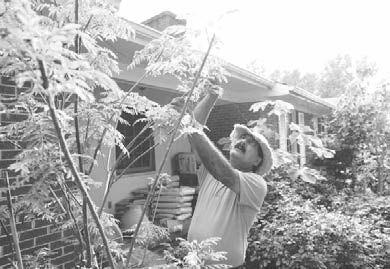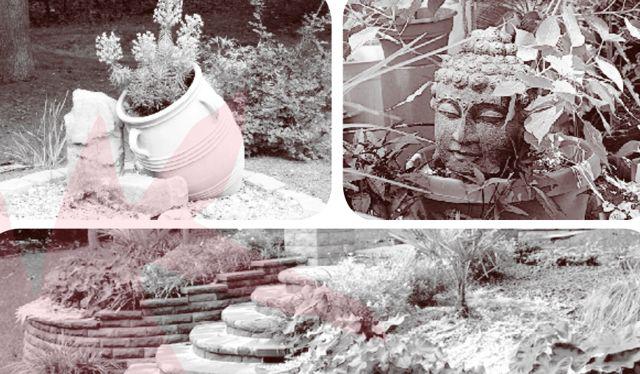在异乡种一片故土
2014-01-06byJessicaJones
by Jessica Jones

When South Asian immigrants living in the U.S. get homesick, they can probably locate an Indian restaurant or grocery store to remind them of home. But one Indian immigrant has found another way to deal with the longing for home. And hes turned it into a thriving business.
Anil Gandhi moved to North Carolina from Mumbai back in 1989, lured by family and good jobs in the telecom industry. But today he makes a living selling the plants of his native India.
The 1)Tulsi plant—also known as holy basil—is one of the most popular items for sale at Gandhis nursery, Vedic Gardens. He opened it three years ago in the town of Morrisville after realizing there was a demand in the South Asian community here for plants from back home.
Gandhi: Now its come to a point where its getting so popular that every single day I have customers calling from out of state asking me to ship plants, whether its a bodhi tree or a...a holy basil or a curry leaf plant, which is another popular one.
As far as Gandhi knows, his business is the only plant nursery in the country catering to South Asians. He got started in the landscaping business 12 years ago, after he was laid off from his telecom job. Hed always loved gardening, so after much thought he decided to start his own landscaping business for the areas growing South Asian community.
Gandhi: So I went to do the landscaping and they would ask, “Well, can we put a mango tree in our yard? Can we put a 2)tamarind here? Can we put a banana here?” So that prompted me to research more into, more, deeper into plants.
Thats when Gandhi began collecting all the plants he needed from online stores and nurseries so his customers could find everything they wanted in one place. Today, they can find everything from 3)spiky 4)turmeric plants to several varieties of jasmine from India and the Middle East. Gandhi 5)propagates most things himself, from seeds he finds on Ebay and in stores.
On any given day at Vedic Gardens, youll find people wandering through Gandhis collection of plants with smiles on their faces. Sudharsan Narva moved here from Connecticut a few years ago and he says theres one thing he always notices when he visits the nursery.
Narva: The smell, first thing. One thing, you know, I can 6)correlate myself with what I used to be long time ago when I was in India, like the smell of the tree and the smell of the flowers and those things. So it feels like home. That makes me really happy here.
A few steps away, Sunita Prabu is examining a 7)cluster of graceful curry leaf plants. Theyll eventually grow into small trees. Prabu says its important to have a good supply of fresh curry leaves for her Indian home cooking.
Many of Gandhis employees were born and raised here in the U.S. and didnt know much about Indian culture before. But theyre learning. The nurserys in a town where 20% of the population is originally from South Asia.
As for Anil Gandhi, he says he never could have imagined, as a boy in Mumbai, that hed end up running an Indian plant nursery in far-off North Carolina.
Gandhi: This is the country that gives you opportunity to do whatever you want to do, and thats what Ive learned. Just honesty and hard work can take you way up there, wherever you want to be.
Gandhi says in opening the nursery, he stumbled across his dream job. He says theres nothing better than growing the familiar plants he loves and sharing them with others.

每当居住在美国的南亚移民们想念家乡时,他们基本上能找到印度餐厅或者杂货店来怀旧一番。但一位印度移民却找到了排解乡愁的另一种方式,还把这做成了一门蒸蒸日上的生意。
1989年,阿尼尔·甘地从孟买移民到了北卡罗来纳州,因为他的家人在这里,而且该州的电信行业能够提供许多好职位。不过,现在的他是以售卖家乡印度的植物来谋生。
圣罗勒(也称作圣洁蓬蒿)是甘地的苗圃——吠陀花园里最受欢迎的植物之一。三年前,他意识到这里的南亚移民群体对于家乡植物的需求,于是就在莫里斯维尔镇开了吠陀花园。
甘地:现在我的生意做得很红火,每天都有顾客从别的州打电话过来订购植物,让我发货,有的人买菩提树,有的人买圣洁蓬蒿,还有咖喱叶也是卖得很好的一种。
据甘地所知,他的吠陀花园是美国唯一一家专门满足南亚移民所需的苗圃。十二年前,他从电信企业下岗之后,就开始从事园林方面的工作。他一直很喜欢园艺,经过深思熟虑后,他决定开一家自己的园林公司,为这个地区日渐增长的南亚移民群体服务。
甘地:我就这样做起了园林生意,人们常常问我:“能不能在院子里种棵芒果树?能不能在这儿种棵罗望子?能不能在那儿种棵香蕉树?”这促使我对植物进行更加深入的研究。
甘地开始从网上商店和苗圃搜罗他需要的所有植物,以便顾客们在一个地方就可以找到所有想要的东西。如今,吠陀花园里的植物一应俱全,从开大穗状花的姜黄到多个品种的茉莉花都可以找到,全部来自印度和中东。这些植物多数都是甘地从亿贝网和商店买来种子并亲手培植而成。
每一天,在吠陀花园里你都可以看到人们漫步在甘地精心栽种的植物间,笑意盎然。苏达森·纳瓦几年前从康涅狄格州搬到这里,他说每次来甘地的苗圃都会注意到一点。
纳瓦:首先是那种气味。你知道,这气味,像这些树、这些花和其他植物的气味,能够让我想起很久以前在家乡印度的情景,感觉就像回到了家乡,所以我在这里感到很开心。
几步开外,苏妮塔·普拉布正在细看着一丛优雅的咖喱叶,它们最终会长成一棵棵小树。普拉布说,有可靠的新鲜咖喱叶供应对她来说很重要,因为这是她烹饪印度家乡菜的必备材料。
甘地的雇员们很多都是在美国出生和长大的,之前对印度文化了解得不多,但在苗圃工作让他们了解了更多印度文化。苗圃所在的镇子有20%的人口都来自南亚。
对于阿尼尔·甘地来说,当他还是个孟买小男孩的时候,怎么也想不到自己最后会来到千里之外的北卡罗来纳州开个专卖印度植物的苗圃。
甘地:这个国家让你有机会做任何你想做的事,这就是我学到的,凭着诚实和勤劳,你可以有所成就,收获自己想要的成功。
甘地说,开这个苗圃让他无意中发现了自己最理想的工作。他说,能够种植自己熟悉而喜爱的植物,并与他人分享,再也没有比这更快乐的事情了。
